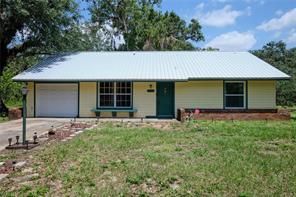8 Mistakes First-Time Home Buyers Should Avoid
Homes for Sale LaBelle • June 10, 2020
Top 8 First-Time Home Buyers Mistakes to Avoid

If you’re looking to buy a house
in 2020, you’ll be pleased to know that it’s a buyer’s market right now. Housing prices have fallen considerably in the last 10 years.
Purchasing a house can be a daunting affair – especially if you’re a first-time home buyer. However, a little preparation and knowledge can go a long way in ensuring your success. Simply follow the tips given below and you’ll do just fine.
1. Don't Go Over Budget
Before you begin browsing through different houses, fix a specific budget. Estimate how much you’ll be able to afford in monthly mortgage payments and ensure that your finances won’t be subject to any adverse effects due to the purchase.
Many people attend open houses
and desire homes that they simply can’t afford – don’t make this mistake! Make a list of your top priorities and needs and ensure that they are properly catered to in the house you’re looking to buy. Making modifications to this list midway is a recipe for disastrous overspending. Stay flexible and focused throughout the process.
The general rule of thumb is that your mortgage payments should not exceed 28% of your gross monthly income. People with other forms of debt should ensure this percentage is even lower for them. You should make all calculations solely on what you earn right now, instead of trying to be excessively optimistic about your income in the future. If you need more help, the Affordability Calculator on the Bank of America website is a nifty tool you can use to calculate how much you can afford to spend.
2. Research Different Types of Mortgages Plans
In order to determine whether you’re eligible for a home mortgage
and for determining your rate, lenders usually consider your personal debt-to-income ratio and credit reports before making a decision.
First-time home buyers will need to submit extra documentation and proofs: You’ll have to submit your IRS returns, financial statements, and pay stubs, which must be prepared and kept ready well ahead in time. You should also go through your credit history thoroughly to ensure there aren’t any surprises on your profile.
You can score the best loan terms by improving your debt-to-income ratio
and credit score before submitting the mortgage application.
3. Approach Multiple Lenders
Though you may be tempted to file a mortgage application at the bank you hold an account at, it doesn’t mean you should restrict your options solely to them. First-time home buyers often don’t consult other lenders, thus causing them to miss out on better home mortgage rates.
Mortgage rates are highly personalized, meaning they are influenced by your personal financial condition, not just the market. As a result, lenders set interest rates that they believe to be appropriate. Different lenders will quote your different fees and interest rates, depending on the circumstances.
You can use this to your advantage by selecting the lender who offers you the lowest mortgage interest rates. You could also negotiate with lenders for a better offer by pitting the quotes against one another.
4. Don’t Confuse Preapproval and Prequalification
When lenders preapprove or prequalify your application for a house mortgage, they’ll provide you a rough estimate of the interest rate they’ll lend you at. Prequalification
only allows you to estimate what your final price range might be. Prequalification doesn’t mean that you’ll be approved for the loan – it does help your chances of approval through.
Preapprovals
are conditional loan approvals where your repayment and credit ratings are subject to a thorough evaluation by company underwriters after checking your income history and credit details. The preapproval remains valid, so long as your financial condition does not deviate significantly from the data you had initially provided to them. You will also have to stick to the property value limit and other lender guidelines.
5. Skipping Home Inspections
Home inspection
happens to be an additional expense that you might not be aware of as first-time home buyers. Some people prefer to forgo this aspect as well since they figure they already know everything they need to. However, professional inspectors have been trained to observe things most people would outright ignore.
Therefore, this is important if you are purchasing a used property (New constructions tend to have builder’s warranty). In case your house requires major repairs, the inspection can help you negotiate lower prices with the homeowner.
6. Budget for Closing Expenses
Buying a home
includes other closing costs apart from the mortgage down payment, including title insurance and attorney fees, which are due upon signing the final mortgage documents. Closing costs are usually somewhere around 3% - 5% of your house’s total purchase price. Don’t forget to account for this expense as well!
7. Budget for Unexpected Home Ownership Expenses
First-time home buyers often have no clue about various home ownership expenses they’re liable for. Apart from monthly mortgage payments, you’ll also need to pay for regular maintenance, property taxes, and homeowners insurance. You might also need to pay extra fees to your co-operative board or homeowners’ association as well.
If you’ve established an escrow bank account, your overall monthly payments will comprise of mortgage interest, principal, insurance, and property taxes. Your house property taxes might even increase further once you’ve bought the house. Depending on your house’s valuation, your monthly payments may see a significant hike.
When you determine how much you’ll be able to afford in monthly payments, don’t forget to factor in these expenses as well.
8. Don't Buy a House That's Too Big (or too Small)
Some people overestimate their needs
and buy a house that’s simply too big. The inverse can also be possible – some people feel suffocated by the size of their house. It’s too late before they realize the gravity of their mistake.
However, you can avoid this by doing this: After you’ve arrived at an estimate of your requirements, imagine your life there. Consider how many people you’ll have to house, how many possessions you have, and your lifestyle and schedule. If that seems too difficult, consider renting a house that is of an identical size and see whether it works out for you. Considering the resources that need to be spent on buying, selling, and purchasing a new house, it’s definitely worth following the instructions given above.



